The federal and state governments, National Assembly, security agencies, among others have been fingered in a report cataloging abuses of rights of journalists practising in Nigeria
The report titled: “The State of Media Freedom in Nigeria,” launched by the Nigeria Union of Journalists (NUJ) and Media Foundation for West Africa(MFWA), at the NUJ Secretariat in Abuja, focused on the last six years of President Mohammadu Buhari-led administration.
The report took note of all journalists killed and those whose deaths have been shrouded in mystery as well as listed journalists harassed by state actors and beaten up in the line of duty.
The report also focused on media houses harrased by security operatives.Speaking at the public presentation of the report, the NUJ National President, Chris Isiguzo, decried the repeated harassment of journalists, noting that media practice in Nigeria has become a dangerous venture.
“For the period being reviewed, 2016- 2020, the report said the highest levels of violence targeting journalists in the country had been recorded. “These statistics constitute an indictment of the poor record on democracy and rule of law in Nigeria.
“The lack of transparency, corruption and politics of exclusion oten result in frustrations and violent rivalries, creating dangerous environments in which journalists become easy targets for powerful forces intent on suppressing dissent and evading public accountability,” he stated.
Similarly, the report read in part: “Politicians have realised that to acquire power, either through legitimate means or through outright manipulations, they need to obtain the connivance of the media.
“And politicians and political office holders also know that to retain power, they require the support of the media, ditto those who wish to ascend to power. Even those whose positions are threatened suddenly realise the need to pocket the media.
“These elements have compounded the problems of the media. The media in Nigeria have suffered a number of setbacks over the years, with the obvious but unsuccessful attempts by government to control them. There are equally increased harassment and killings of journalists in the country.
“These acts are daily causing frustrations among media professionals in the country.
Politicians, both in and out of government are increasingly filing legal cases against journalists who especially report on allegations of corruption, while security operatives have been used to block access for reporters in several areas.
“Acts of impunity against journalists, particularly murder, is the ultimate form of censorship. These unfortunately, are likely to continue unabated. From the murder of Dele Giwa in 1986 through a parcel bomb, the killers are yet to be fished out and brought to book.
“Since then several attacks have been recorded against journalists, in spite of the fact that attacks against journalists and media equipment are illegal under international humanitarian law and the Nigerian legal system.
“Clear signals indicate that such killings are sponsored by desperate politicians and high office holders who had things they wished kept secret.
“For the period being reviewed, 2016- 2020, we have recorded some of the highest levels of violence targeting journalists in the country. These statistics constitute an indictment of the poor record on democracy and rule of law in Nigeria.
“The lack of transparency, corruption and politics of exclusion often result in frustrations and violent rivalries, creating dangerous environments in which journalists become easy targets for powerful forces intent on suppressing dissent and evading public accountability.”
The report further noted that, “The increasing rate of violations of media professionals and members of their families, is a clear signal that journalists are now being deliberately targeted as a result of the work they do.
“At least 300 violations affecting about 500 journalists, media workers and media houses have been recorded in Nigeria under the regime of President Buhari.
“On April 11, 2016 around 3am, an unknown gunman kidnaped Tope Kuteye, the Channels TV correspondent in Owerri, lmo state, from his home. The kidnapper later made a ransom demand of N15 million.
“On December 2016, the Department of State Service (DSS) in Lokoja, Kogi state, arrested the Publisher of Policy and Lawmaker Magazine, Friday Ogungemi, and detained him without trial.
“This action, which was at the instance of Governor Yahaya Bello of Kogi state, was another example of how prominent Nigerians react to Media scrutiny.
“Friday Ogungemi’s alleged crime was authoring an Editorial on the Chief of Staff to the Governor of Kogi state, Mr Edward Onoja.
“On January 17, 2017, the Borno State Police Command arrested and detained the Publisher of National Trial Newspaper in Abuja, at the instance of a top politician in 2016. This Journalist had to send an SOS to the NUJ and friends that there was threat to his life in detention. It took the intervention of the Union to secure his release.
“On January 13, 2017, the Police CID in Area 10 Garki, Abuja, arrested and detained Desmond Utomwen, publisher of Freshnews, an online newspaper, at the instance of a serving Customs officer, Inspector Umaru Faru.
“Desmond was working on a story which allegedly was critical of the said officer. Desmond was released following the intervention of Police AIG Usman Shehu who received a complaint from the NUJ. The Union demanded for a thorough investigation by the customs of the alleged corruption by Umaru Faru, but to no effect.
“On January 19, 2017, the police arrested Premium Times Publisher, Dapo Olorunyomi alongside the Judiciary Reporter, Evelyn Okakwu, and held them for several hours at Police Headquarters in Abuja. This was at the instance of the Chief of Army Staff then, Lt Gen Tukur Yusuf Buratai who complained about defamation of character.
“On April 19, 2017, some men of the Criminal Investigation Department (CID) of the Nigeria Police Force, arrested and detained Midat Joseph, correspondent of the Leadership newspaper for being critical of Kaduna State government and the Governor Nasir el-Rufai’s administration. The journalist later released on bail granted by a court after spending two nights at the Police cell.”




